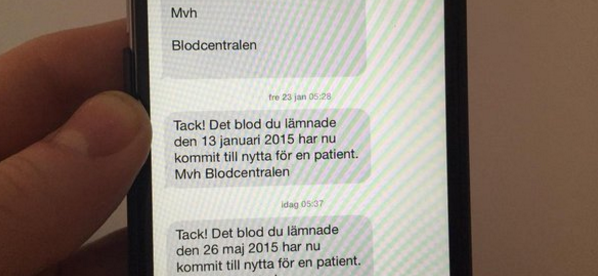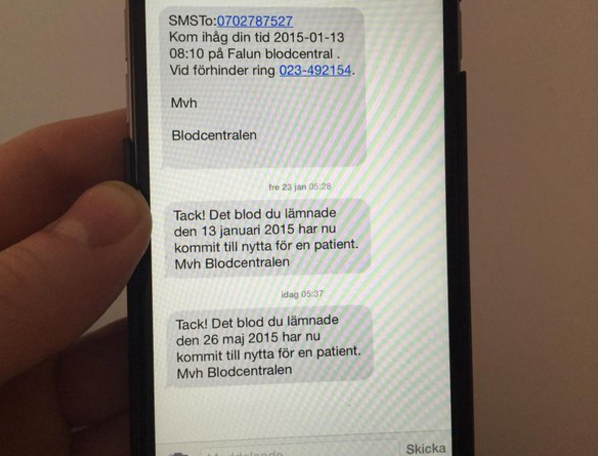“We Won’t Give Up Until You Bleed”

You enter the gymnasium to find a bunch of cots positioned around the room. There are people lying down on most of them, each person hooked up to an IV, likely chatting idly or staring off into some untold spot in space daydreaming. None of them will be there for very long — no more than a few minutes each. That’s when the cookies and orange juice arrive — the reward for giving blood.
Blood donation is an important element to any health care system, especially but hardly limited to times of crisis. Unfortunately, donor banks often have a hard time attracting donors; very few do it for the free OJ. In general, the donation process is a somewhat uncomfortable, incredibly boring, and thankless task.
Sweden is trying to change that — or, at least, the “thankless” part.
For years, Sweden was battling against relatively low blood donation rates, putting the lives of patients at risk. In 2011, Sahlgrenska University Hospital in the Swedish city of Gothenburg decided to try something new. Instead of simply thanking the donors when they donated, the hospital developed a way to thank them when their donation was put to good use. Per the Independent, at the time of donation, the donor’s cell phone number was associated with the donated blood. At the time of transfusion — often weeks later — the blood bank texted the donor to inform him or her that a (still anonymous) recipient had received a lifesaving treatment thanks to the donor’s earlier efforts, as seen below (via Twitter).

And as TIME reports, Sweden isn’t stopping at text-messaged thank yous. Instead, they’ve expanded the program to include ways to get new donors into the fold. Would-be donors can sign up for alerts, too (perhaps because a friend peer pressured them into it). But having not yet donated, these people don’t get messages about when their blood was used. Instead, they get occasional reminders about the importance of becoming blood donors until they become donors themselves (TIME describes it as a “nag me until I become a blood donor”). The service doesn’t mince words — “we won’t give up until you bleed” is one of the messages one may receive.
Whether these programs work, though? As of 2015, that’s unknown — there simply wasn’t enough data yet. But the good news is that the Swedish texting program has reverberated on Twitter and other social media platforms — and that social sharing may lead to a net positive effect. In 2013, per the Huffington Post, Johns Hopkins School of Medicine published a study on the effect of social media on organ donation. When people shared that they had become organ donors, many of their friends became organ donors as well. So perhaps when someone shares a text about their now-used blood donation, their friends will sign up to become blood donors.
Bonus Fact: In 2015, Sweden began another unique, phone-based marketing campaign — one around tourism, this time, not around blood donation. Called “The Swedish Number,” it gives anyone in the world an opportunity to pick up the phone and talk with a random Swede. By dialing +46 771 793 336, you’d be connected with someone volunteering for the Swedish Tourist Association. The idea was to give an unbiased insight into the people and culture of the country, and also celebrate the 250th anniversary of the end of Sweden’s censorship laws. That latter part is key to the campaign; as the official website for The Swedish Number states, you’re welcome to “talk about anything.”
From the Archives: The Swedish Coffee (and Tea) Experiment: Unlike the blood donations and call-a-Swede ones, this one is not a nice experiment.
Take the Quiz: Translate these text messages into Beatles songs.
Related: A quick reference guide to text messaging shorthand, important if you think “LOL” means “lots of love.”
